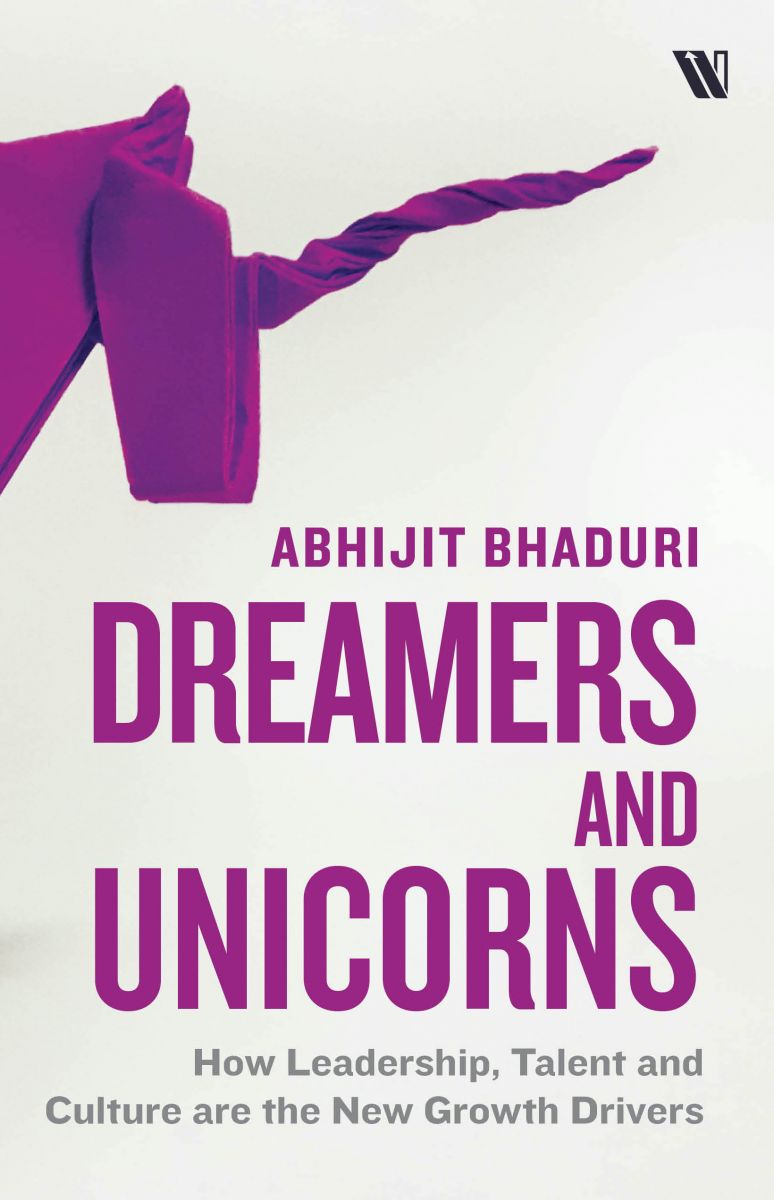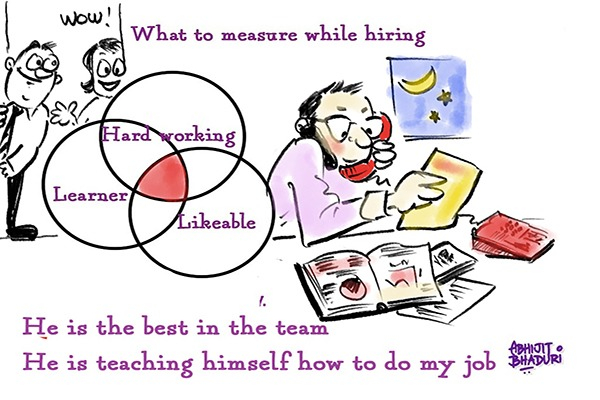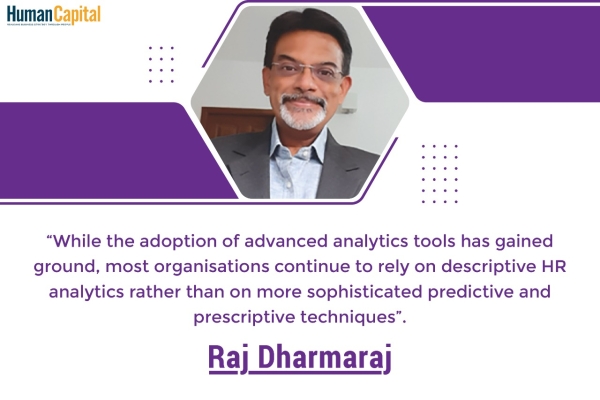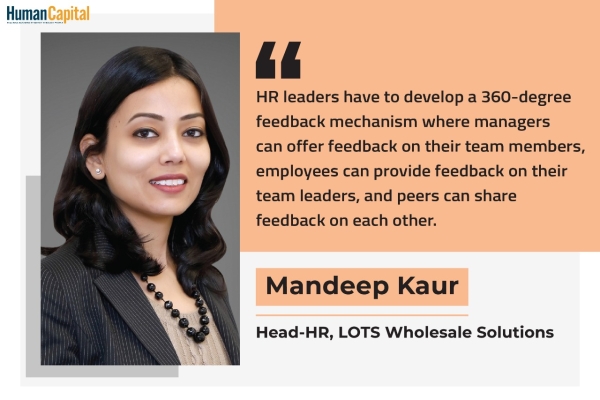What makes someone an effective hire boils down to three characteristics. Do they have the knowledge to do the job? Are they motivated to work hard (on their own)? Do they have social skills that will make it easy for them to work with others?
I am not going to use HR speak by using terms like competencies, competency maps, skills vs traits etc. I will attempt to put it in business language even if it is not a 100 per cent accurate as per the pundits.
What makes someone an effective hire boils down to three characteristics. Do they have the knowledge to do the job? Are they motivated to work hard (on their own)? Do they have social skills that will make it easy for them to work with others?
1. Are they learners and problem solvers?
Assess for actual problems that they will need to solve in the role. Ask them how they would go about solving the biggest problem they will have to solve when they start. Assess their approach to problem-solving by giving them a problem that was solved and compare their approach to what was done. How do they react when faced with a question they do not know? Do they bluff their way through or will they teach themselves?
Curious people are great learners. Leonardo da Vinci wrote and drew on subjects including geology, anatomy (which he studied in order to paint the human form more accurately), flight, gravity and optics, often flitting from subject to subject on a single page, and writing in left-handed mirror script. He ‘invented’ the bicycle, airplane, helicopter, and parachute some 500 years ahead of their time. Elon Musk literally taught himself rocket science by reading every textbook on the subject. Then he cold-called experts and learned from them.
2. Are they willing to work hard?
Energetic people who are self-driven are an asset. In the scenario when everyone is working from home this is a particularly valuable trait to look for in people. When they are on their own, will they continue to set equally high standards and drive themselves just as hard? There will be deadlines to meet that need extending beyond the usual. There will be a crisis with a team member that needs everyone to pitch in.
People who set high standards for themselves also set the bar high for others. They are comfortable perfecting their routine over years. Or spend a day polishing up a short speech until it is perfect. Willingness to work hard matters. It matters a lot.
Consider two cricketers who started their careers at the same time—Vinod Kambli and Sachin Tendulkar. Kambli did better than Sachin in school and college cricket. He scored two double centuries and two centuries in his first few international Test matches. Kambli also had a better ODI average then Sachin when both were playing. It was Sachin who became a legend. He just worked way harder than anyone else.
3. Are they likeable and pleasant in their interactions with others?
Satyajit Mohanty, CHRO of Crompton, a consumer goods company (and a client) told me that when he became a CHRO for the first time of a company, he sought advise from various CHROs. One common advice he received was: ‘The CEO has to like you and should be able to talk to you.’ Likeability comes from the ability of the person to understand others’ emotions and needs. Being able to adapt to the emotions of the others makes us likeable.
We feel good after interacting with them. They are pleasant and easy to understand. Emotionally agile people are often viewed by others as being very tactful and even ‘politically savvy’. If the term ‘political’ makes you uncomfortable, replace that word with ‘influential’. People with high EQ can work with many different kinds of team members because they can build trust and because they are predictable. Likeable people are able to take large groups of diverse opinions and interests along on their own journey. Likeable people can give someone disappointing or difficult news without demolishing their self-worth.
Very few people are equally strong in all the three areas, but to have a really successful career, the person must be extremely strong in at least two of the three areas.

This is an excerpt from Abhijit’s newly released book ‘Dreamers and Unicorns: How Leadership, Talent and Culture are the New Growth Drivers’ published by Westland Publications.

Has COVID-19 forever changed the way we live and work?
Trending
-
SBI General Insurance Launches Digital Health Campaign
-
CredR Rolls Out 'Life Happens' Leave For Its Employees
-
Meesho Announces 30-Week Gender-Neutral Parental Leave Policy
-
Microsoft Unveils Tech Resilience Curriculum To Foster An Inclusive Future
-
60% Indian Professionals Looking For Job Change Due To COVID: Survey
-
SpringPeople And Siemens Collaborate For Digital Transformation Push
-
86% Professionals Believe Hybrid Work Is Essential For Work Life Balance: Report
-
Almost 1 In Every 3 People's Personal Life Affected Due To Work Stress
-
Meesho Rolls Out Reset And Recharge Policy For Employees
-
80% Of Talent Leaders & Academics Say Pandemic Changed Skill Needs For Youth: Report
-
Hero Electric Rolls Out 'Hero Care' Program For Employees
-
Human Capital In Collaboration With ASSOCHAM Hosts Virtual Conference
-
IKEA India, Tata STRIVE Collaborate To Create Employability And Entrepreneurship Opportunities
-
SAP India, Microsoft Launch Tech Skilling Program for Young Women
-
DXC Technology, NASSCOM Collaborate For Employability Skills Program
-
Lenskart To Hire Over 2000 Employees Across India By 2022
-
Mindtree Launches Learn-and-Earn Program
-
Tata AIA Extends 'Raksha Ka Teeka' To Its Employees
-
Swadesh Behera Is The New CPO Of Titan
-
NetConnect Global Plans To Recruit 5000 Tech Professionals In India
-
Hubhopper Plans To Hire 60% Of Indian Podcasters By 2022
-
Corporate India Needs More Women In Leadership Roles: Report
-
Aon to Invest $30 Million and Create 10,000 Apprenticeships by 2030
-
Tech Mahindra Launches ‘Gift a Career’ Initiative for Upskilling of Youth
-
40% Women Prefer Flexible Working Options in Post-COVID World: Survey
-
3 out of 4 companies believe they can effectively hire employees virtually: Report
-
Vodafone , CGI and NASSCOM Foundation launch digital skills platform
-
Odisha: Bank, postal employees to deliver cash for elderly, differently-abled persons
-
Skill India launches AI-based digital platform for "Skilled Workforce"
-
Hiring activity declines 6.73% in first quarter: Survey
-
70% startups impacted by COVID-19 pandemic
-
Bajaj Allianz Life ropes in Santanu Banerjee as CHRO
-
Over 70 Percent MSMEs look at cutting jobs to sustain businesses
-
93 Per Cent employees stressed about returning to office post-lockdown
-
Johnson & Johnson India announces family benefits for same gender partners
-
Indian firms turning friendly towards working mothers
-
Welspun India names Rajendra Mehta as new CHRO
-
Wipro partners with NASSCOM to launch Future Skills platform



Human Capital is niche media organisation for HR and Corporate. Our aim is to create an outstanding user experience for all our clients, readers, employers and employees through inspiring, industry-leading content pieces in the form of case studies, analysis, expert reports, authored articles and blogs. We cover topics such as talent acquisition, learning and development, diversity and inclusion, leadership, compensation, recruitment and many more.
Subscribe Now












































Comment